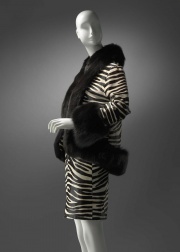Difference between revisions of "Black fox"
Jump to navigation
Jump to search
| Line 1: | Line 1: | ||
| − | [[File:2009.4091.1-SC227081.jpg|thumb|Black fox fur<br> | + | [[File:2009.4091.1-SC227081.jpg|thumb|Black fox fur<br>MFA# 2009.4091.1]] |
== Description == | == Description == | ||
| Line 6: | Line 6: | ||
[[File:blackfoxwp2.jpg|thumb|Black fox kit]] | [[File:blackfoxwp2.jpg|thumb|Black fox kit]] | ||
| − | == | + | ==Resources and Citations== |
| − | * ''Encyclopedia Britannica'', http://www.britannica.com Comment: "fox" | + | * ''Encyclopedia Britannica'', http://www.britannica.com Comment: "fox" [Accessed November 8, 2001]. |
* Edward Reich, Carlton J. Siegler, ''Consumer Goods: How to Know and Use Them'', American Book Company, New York City, 1937 | * Edward Reich, Carlton J. Siegler, ''Consumer Goods: How to Know and Use Them'', American Book Company, New York City, 1937 | ||
Latest revision as of 07:30, 8 May 2022
Description
A color variation of some red foxes (Vulpes vulpes or Vulpes fulva). Black foxes are native to North America. Their fur is fine and black with long silky guard hairs. Fox pelts have been used for trim, capes, collars, and cuffs.
Resources and Citations
- Encyclopedia Britannica, http://www.britannica.com Comment: "fox" [Accessed November 8, 2001].
- Edward Reich, Carlton J. Siegler, Consumer Goods: How to Know and Use Them, American Book Company, New York City, 1937

